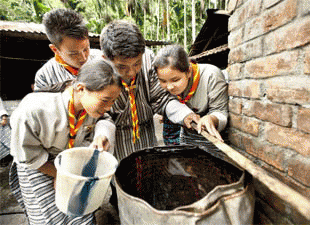Growing resistance to artemisinin is threatening to roll back gains made
in combating the disease, said malaria experts at a health conference in
Sydney, Australia last week.
AsianScientist (Nov. 5, 2012) – Growing resistance to a key anti-malarial drug
derived from a shrub used in traditional Chinese medicine is threatening to
roll back gains made in combating the disease, said malaria experts at a health
conference in Sydney, Australia last week.
Delegates at the Malaria
2012: Saving Lives in the Asia-Pacific conference emphasized the
importance of strong political leadership and regional coordination after
discussing resistance to anti-malarial drugs in the region’s fight against the
disease.
“Anti-malarial drug resistance is
one of the greatest challenges to continued success in controlling and
eliminating malaria in the Asia-Pacific,” the Director of the Global Malaria Program
of the UN World Health Organization (WHO), Dr. Robert Newman, told the
gathering.
Malaria, which is caused by a
parasite transmitted to humans through the bites of infected mosquitoes,
infects some 216 million people and kills nearly 650,000 people around the
world every year.
The Asia-Pacific region, which
includes 20 malaria-endemic countries, accounted for about 30 million of these
cases, and 42,000 of the deaths. India, Indonesia, Pakistan, Myanmar, and Papua
New Guinea bear the largest burden of the disease.
The declining efficiency of
therapies based on artemisinin – an extract from the sweet wormwood bush and
currently the frontline treatment recommended by the WHO for the most deadly
species of the malaria parasite, Plasmodium falciparum –
raises concern that resistance might spread to India and then Africa, making
elimination of the disease impossible.
Artemisinin
was first discovered by Tu Youyou during the Cultural Revolution of
the 1960s when the Chinese government launched a clandestine military research
program aimed at finding a remedy for the deadly scourge. She won this year’s
Lasker DeBakey Clinical Medical Research Award for the discovery.
However, artemisinin resistance
has been detected in Cambodia, Myanmar, Thailand, and Vietnam. In April this
year, two studies were published in The Lancet and Science describing
the growing
malarial resistance at the Thai-Myanmar border.
“It will be critical to galvanize
political action and secure investments to implement an emergency response plan
for the Greater Mekong Subregion,” Dr. Newman told delegates, referring to the
Southeast Asian river that passes through the countries where artemisinin
resistance has emerged.
At the conference, Australian Foreign
Minister Bob Carr pledged more than AU$100 million over the next four years
to support malaria programs in the Asia-Pacific region.
Source: UN


No comments:
Post a Comment